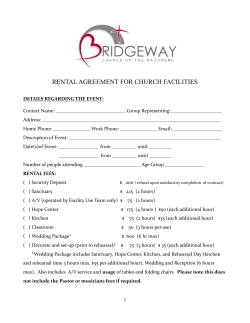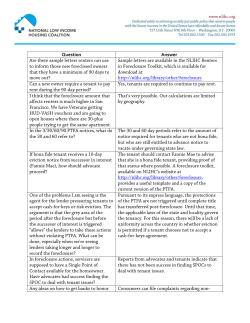
I Renters Insurance
Renters Insurance I f you rent a house or apartment and think that your landlord is financially responsible when there is a fire, theft or other catastrophe— think again. Your landlord may have insurance to protect the building you are living in. But your landlord’s policy won’t replace your personal possessions or pay for your living expenses while the building is being repaired. The only way to protect yourself financially against disasters is to buy a renters insurance policy. R enters insurance, sometimes referred to as tenants insurance, includes three basic types of protection: • Personal Possessions • Liability • Additional Living Expenses Personal Possessions Standard renters insurance protects your personal belongings against damage from fire, smoke, lightning, vandalism, theft, explosion, windstorm, water and other disasters listed in the policy. Floods and earthquakes are not covered. Supplemental insurance is available to cover these disasters—see the Frequently Asked Questions section of the brochure for more information. To decide how much insurance to buy, you need to know the value of all your personal possessions—including furniture, clothing, electronics, appliances, kitchen utensils and even towels and bedding. In other words, if your home were to burn, you should have enough insurance to replace all of your possessions. The easiest way to figure out how much insurance coverage to buy is to create a home inventory (a detailed list of all of your personal possessions, with their estimated value). To help make this task easier, the Insurance Information Institute offers free Web-based software, which you can find at www.knowyourstuff.org. An up-to-date home inventory will also make filing an insurance claim faster and easier. Liability Standard renters insurance policies provide liability protection against lawsuits for bodily injury or property damage that you or your family members cause to other people. It also pays for damage your pets cause. So, for example, if your son, daughter or dog accidentally ruins your neighbor’s expensive rug, you’ll be covered. However, if your children or pets destroy your own rug, you will not be covered. The liability portion of a renters policy pays for both the cost of defending you in court and for court awards, up to the limit of the policy. Liability limits generally start at about $100,000. Some experts recommend that you buy at least $300,000 worth of protection. You can also buy an Umbrella or Excess Liability policy, which provides higher limits and broader coverage. Generally, umbrella policies cost between $200 to $350 a year for an extra $1 million of liability protection. Your policy also provides No-fault Medical coverage. So, if a friend or neighbor is injured in your home, you There are can submit their medical bills two types directly to your insurance of renters company. You can generally insurance get $1,000 to $5,000 worth polices of this coverage. It doesn’t, however, pay the medical Actual Cash Value bills for your own family or pays to replace your pet. your possessions Additional Living Expenses Many people don’t know that Additional Living Expenses coverage, also known as ALE, is included in a renters insurance policy. If your home is destroyed by a disaster that your policy covers and you need to live elsewhere, renters insurance covers your additional living expenses. Policies will generally reimburse you the difference between your additional living expenses and your normal living expenses. ALE covers hotel bills, temporary rentals, restaurant meals and other expenses you have incurred while your home is being rebuilt. minus an amount for depreciation (the reduction in the value of items due to age and use) up to the limit of your policy. Replacement Cost pays the actual cost of replacing your possessions (with no deduction for depreciation), up to the limit of your policy. The price of Replacement Cost coverage is about 10 percent more than Actual Cash Value coverage but can be well worth the extra cost. How to Buy Renters Insurance R enters insurance is easy to get, and there are many insurance companies to choose from. Insurers who offer homeowners insurance generally also sell renters insurance. In fact, a renters insurance policy and a homeowners insurance policy are almost identical. The main difference is that a renters policy doesn’t include coverage for the building, since the landlord owns that. Comparison Shop Prices vary from company to company, so it pays to shop around. Get at least three price quotes. You can call companies directly or get quotes from the Internet. Your state insurance department (contact information is on the back of this brochure) may also provide information about prices. Get quotes from different types of insurance companies. Some insurers sell through their own agents. These agencies have the same name as the insurance company. Some sell through independent agents, who offer policies from several insurance companies. Others don’t use agents at all but sell directly to consumers over the phone or via the Internet. But don’t shop by price alone. Select a company that answers your questions and handles claims fairly and efficiently. Ask friends and relatives for their recommendations. Look for an agent or company representative who takes the time to answer your questions. Remember, you’ll be dealing with this person if you have an accident or other emergency. Ask Your Insurer How You Can Save Money These are some ways to save money on premiums: Consider taking a higher deductible (the amount of money you have to pay toward a loss before your insurance company starts to pay a claim). The higher your deductible, the more money you save on your premium. Consider a deductible of at least $500. If you can afford to raise it to $1,000, you may get as much as 25 percent off your premium. Remember, though, that you’ll pay the deductible each time you file a claim. Insurance companies often offer discounts on renters insurance if you have another policy with them for your car or business. You can also get discounts if your apartment has a security system, smoke detectors or deadbolt locks. More discounts might be available depending on your age or whether or not you smoke. Frequently Asked Questions Q. Is my bicycle covered by renters insurance? A. Your bicycle and other recreational or sports equipment are covered. There are also special policies you can buy for very expensive sports equipment. Q. Is my car covered? A. Vehicles aren’t covered by renters insurance. You need to get a separate auto insurance policy to drive legally and protect your car, van or motorcycle. Q. As a student, am I covered by my parents’ insurance? A. If you’re a college student living in a dorm and are still part of your parents’ household, their homeowners or renters insurance provides coverage. If you live off campus, you’ll probably need your own renters policy. Policies can vary, so speak to your insurer about this. Q. Can I purchase a automatically insured, renters policy with my like a husband or wife, roommate or domestic under the partner’s partner? policy. He or she must be A. Regulations differ from specifically named. state to state, and Q. What happens if policies might also something I have differ from company to rented or borrowed company. Find out is stolen? what regulations apply A. Items that are “in your where you live. Some possession” are covered insurance companies under a standard renters allow unmarried couples policy, whether they are who have been living things that you’ve together to buy joint bought, received as gifts coverage. But a domestic or borrowed. partner is usually not ® Filing a Renters Insurance Claim Report any crime to the police If you are the victim of a theft or your home has been vandalized or burglarized, report it to the police. Get a police report and the names of all law enforcement officers that you speak with. Phone your agent or company immediately and get answers to these questions • How long to I have to file a claim? (There are time limits on claims filing.) • Do I have the coverage I need? • Does my claim exceed my deductible? • How long will it take to process the claim? If you need to relocate, keep your receipts If your home is severely damaged and you need to find other accommodations while repairs are being made, keep records of all expenses. Get claim forms Once you’ve notified your insurer of your claim, the company is required to send the necessary claim forms to you by the end of a set time period. (The time period varies from state to state.) Return the properly filled out forms as soon as possible to speed up your claim. Prepare a list of lost or damaged articles If you feel your insurer hasn’t given you satisfactory You’ll need to substantiate your loss. Don’t throw out damaged items until a claims adjuster has visited your home. You should also consider photographing or videotaping the damage. Prepare a list of damaged or stolen items for your adjuster along with copies of receipts. representative who sold you your policy or your insurer’s service, you should talk to the agent or company claims manager. If you’re still unhappy, contact your state insurance department or local consumer protection office to discuss what you can do State insurance department telephone numbers and Web site addresses are on the back cover of this brochure. Frequently Asked Questions continued Q. Is my property covered example, if you have away from home? $25,000 worth of A. Yes, most renters polices personal possessions include what is called insurance, you may Off-premises coverage. be covered for up to This means that $2,500, or 10 percent belongings that are of the total. outside of your home are Q. Are my valuables also covered against the covered by my renters same disasters listed in insurance policy? your policy. For example, A. In general you are coverproperty stolen from ed for up to $1,500 your car would be for jewelry or other covered. However, there expensive items that are generally dollar limits are destroyed or lost to on the amount you can fire, windstorms, theft be reimbursed. For or other perils that are listed in your policy. If your valuables are worth more than that, you should consider purchasing a “floater,” also called an “endorsement,” to increase the amount of coverage. Q. How can I protect my house or apartment against a flood or earthquake? A. Renters insurance does not cover floods or earthquakes. Flood coverage is available from the National Flood Insurance Program (888-379-9531, www.floodsmart.gov ) and from a few private insurers. You can get this coverage, however, from the same agent or company representative who sold you the renters insurance policy. Earthquake coverage can be a separate policy or an “endorsement” to your renters policy. State Insurance Departments AK AL AR AZ CA CO CT DC DE FL GA HI IA IL IN ID KS KY LA MA MD ME MI MN MO MS MT NC ND NE NH NJ NM NV NY OH OK OR PA PR RI SC SD TN TX UT VA VT WA WI WV WY 907-269-7900 334-269-3550 501-371-2600 602-364-3100 800-927-4357 303-894-7499 860-297-3800 202-727-8000 302-674-7300 850-413-3140 404-656-2070 808-586-2790 515-281-5705 217-782-4515 317-232-2385 208-334-4250 785-296-3071 800-595-6053 225-342-5900 617-973-8700 410-468-2000 207-624-8475 517-335-3167 651-296-2488 573-751-4126 601 359 3569 406-444-2040 919-807-6750 701-328-2440 402-471-2201 603-271-2261 800-446-7467 505-827-4601 775-687-4270 800-342-3736 614-644-2658 405-521-2828 503-947-7980 717-787-2317 787-722-8686 401-462-9500 803-737-6160 605-773-3563 615-741-2241 800-252-3439 801-538-3800 804-371-9741 802-828-3301 360-725-7080 800-236-8517 304-558-3354 307-777-7401 www.dced.state.ak.us/insurance www.aldoi.org http://insurance.arkansas.gov www.id.state.az.us www.insurance.ca.gov www.dora.state.co.us/insurance www.ct.gov/cid/site/default.asp www.disb.dc.gov/disr/site/default.asp www.delawareinsurance.gov www.floir.com www.gainsurance.org http://hawaii.gov/dcca/areas/ins www.iid.state.ia.us http://insurance.illinois.gov www.in.gov/idoi www.doi.idaho.gov www.ksinsurance.org http://doi.ppr.ky.gov/kentucky www.ldi.la.gov www.state.ma.us/doi www.mdinsurance.state.md.us/sa/jsp/Mia.jsp www.maine.gov/pfr/insurance http://www.michigan.gov/ofis www.commerce.state.mn.us http://insurance.mo.gov www.mid.state.ms.us http://sao.mt.gov/insurance/index.asp www.ncdoi.com www.nd.gov/ndins www.doi.ne.gov www.nh.gov/insurance www.state.nj.us/dobi/index.html www.nmprc.state.nm/id.htm http://doi.state.nv.us www.ins.state.ny.us www.ohioinsurance.gov www.ok.gov/oid www.cbs.state.or.us/external/ins www.ins.state.pa.us/ins/site/default.asp www.ocs.gobierno.pr/ocspr www.dbr.state.ri.us www.doi.sc.gov www.state.sd.us/drr2/reg/insurance www.state.tn.us/commerce www.tdi.state.tx.us www.insurance.utah.gov www.scc.virginia.gov/division/boi www.bishca.state.vt.us www.insurance.wa.gov www.oci.wi.gov www.wvinsurance.gov http://insurance.state.wy.us 110 William Street NY, NY 10038 www.iii.org Reviewed by: Cooperative State Research, Education, and Extension Service, USDA www. csrees.usda.gov Federal Citizen Information Center www.pueblo.gsa.gov National Consumers League www.nclnet.org
© Copyright 2025










